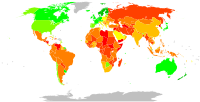
Photo from wikipedia
ABSTRACT Poverty and corruption can both immiserate a nation. Globalisation through open trade can potentially increase economic growth, providing employment and increased incomes to the poor. Corruption can dampen or… Click to show full abstract
ABSTRACT Poverty and corruption can both immiserate a nation. Globalisation through open trade can potentially increase economic growth, providing employment and increased incomes to the poor. Corruption can dampen or even reduce these positive developments. Although globalisation is considered instrumental in development strategies, theoretically, the impact of globalisation on poverty reduction is ambiguous, an ambiguity that is also reflected in the empirical literature. The corruption-poverty literature clearly reveals that empirical findings on such association are at best heterogeneous. This article examines the effects of globalisation and corruption on poverty using time series data for South Africa for the period 1991–2016. Three indicators of poverty and recently developed measures of globalisation and corruption were employed in the logistic regression model used for estimation. The results confirm that globalisation reduces poverty while corruption intensifies it. The globalisation findings are robust across the different measures of poverty while unidirectional results show corruption increases poverty.
Journal Title: Development Southern Africa
Year Published: 2019
Link to full text (if available)
Share on Social Media: Sign Up to like & get
recommendations!